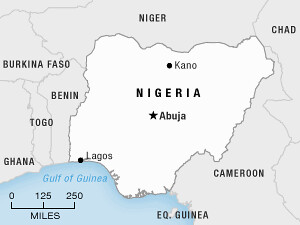
Areas in the West African state of Nigeria where violence has flared again. Dozens have been killed in sectional strife., a photo by Pan-African News Wire File Photos on Flickr.
March 9, 2012
Failed Raid to Rescue Hostages in Nigeria Stirs Italy’s Anger
By ELISABETTA POVOLEDO and JOHN F. BURNS
New York Times
ROME — The failed attempt to rescue a Briton and an Italian who had been held hostage for months by an Islamist militant group in Nigeria set off diplomatic sparring on Friday, after Italian leaders complained that Britain had kept them in the dark about the raid, which left both hostages dead.
President Giorgio Napolitano of Italy, in comments to reporters, said the British decision to take action “without informing or consulting” Italy was “inexplicable.” He added his voice to a chorus of politicians and commentators who criticized the raid, which Nigerian and British forces carried out on Thursday.
A curt note issued by the Italian government on Thursday night said that Prime Minister David Cameron of Britain had informed the Italian prime minister, Mario Monti, of the raid only after its “tragic conclusion.”
The British government’s response to the Italian outbursts was robust. A spokesman for Mr. Cameron, speaking under the no-attribution rules governing briefings at 10 Downing Street, said Britain and Italy had been in close contact since the men — Christopher McManus, 28, of Britain and Franco Lamolinara, 48, of Italy — were kidnapped.
The spokesman acknowledged, in effect, that Britain had not consulted with the Monti government in planning the operation. “We contacted the Italians yesterday as the operation was getting under way, but this was a very fast-moving situation. Our priority was to respond to the situation on the ground and to do everything we could to try and secure the safe release of the two hostages.”
He said that Mr. Cameron spoke to Mr. Monti afterward, telling him that the two hostages were dead.
The decision to authorize the operation — and not to inform Italy in advance — was made personally by Mr. Cameron, a fact he acknowledged in his statement on the raid Thursday night.
British security officials, who insisted on anonymity so they could speak candidly, said that about 20 men from the Special Boat Squadron, an arm of the Royal Marines that is one of Britain’s crack special forces units, were involved in the operation, together with Nigerian troops.
British Defense Ministry officials said that the British commandos stormed the kidnappers’ hide-out while Nigerian forces formed a cordon farther back, and that the kidnappers resisted, leading to a brief gunfight in which one of the kidnappers was killed and two others captured. But when the commandos entered the building, the officials said, they found the two hostages dead, apparently shot by their captors as the troops moved in.
It was the second hostage-recovery raid authorized by Mr. Cameron, and the second to end badly, after the United States Special Forces raid in Afghanistan in October 2010 that resulted in the death of a Scottish aid worker, Linda Norgrove, who was killed by a grenade thrown by one of the American soldiers.
The debate in Italy focused less on the failure of the raid, however, than on the perceived diplomatic slight. In a front-page editorial in the Milan newspaper Corriere della Sera, a prominent foreign policy expert, Antonio Puri Purini, wrote that Britain had landed an “unacceptable slap in the face,” calling the lack of communication a “humiliation.”
Other Italian commentators concurred. “The fact that Italy doesn’t have much international clout is a fact, not an opinion, in part also because of the negative stereotypes of the past,” said Lucio Caracciolo, the editor of Limes, an Italian foreign policy journal.
Deputy Prime Minister Nick Clegg, leader of the Liberal Democrats, who are coalition partners with Mr. Cameron’s Conservatives, defended the decision to go ahead with the raid without informing the Italians before the operation began. He said that the sequence of events, from the moment when the hostages’ whereabouts were established to the storming of the building, had happened so fast that consultations with the Italians had been impractical.
“Everyone needs to remember that these things move extremely quickly,” he said.
British terrorism experts said the Cameron government’s decision not to consult the Italians was also based on a longstanding disagreement on the best way to handle hostage situations. The Italians, they said, have been willing to pay ransoms — something Britain and the United States adamantly oppose.
British and American security officials have also said in the past they have been wary of sharing intelligence involving hostages with Italian units, fearing that the information will be leaked, either because of lax Italian security rules or the eagerness of Italian officials to head off rescue operations.
The hostages were engineers working for an Italian construction company in an area of northern Nigeria where militant Islamic groups have mounted intensifying attacks. They had been held by members of the militant Islamic group Boko Haram since last May.
Elisabetta Povoledo reported from Rome, and John F. Burns from London.
No comments:
Post a Comment